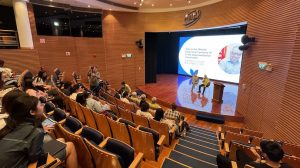Undergraduate theses were completed by 121 IFT students in the first semester of academic year 2016/17. The findings of the best theses were presented at the third Tourism Education Student Summit (TEd Summit), held in January. Best Paper Award scholarships were given to 4 students.
Since academic year 2015/16, all IFT students enrolled in daytime degree programmes leading to Bachelor of Science have been required to complete a thesis of their own before they can graduate. The exceptions are students taking the Culinary Arts Management programme, which leads to the degree of Bachelor of Arts. The purpose of the thesis requirement is to give undergraduates the chance to think independently and to develop their critical and analytical skills.
Thesis/Project Regent Dr. Laurie Baker-Malungu says: “What the thesis does is, it gives an element of managerial capacity.” She adds: “Our graduates need to be well equipped to face new challenges.”
More than 400 IFT students have met the undergraduate thesis requirement since academic year 2015/16. Among them, 61 were invited to present their findings at a TEd Summit, which entailed having their work published in the summit proceedings, accessible on the IFT website.
“We are very happy that around 280 students completed their theses in the first year, and pleasantly surprised that 12 of them were able to submit papers to international conferences and got accepted,” says IFT President Dr. Fanny Vong. Dr. Vong says 3 of the 12 won awards for their papers.
Up to now, students, after coming up with their research proposals in Year 3, have had a full semester in Year 4 to finish their theses. Some students do it in the first semester, others in the second. But feedback from students and academics has led to a change: from academic year 2017/18, the thesis module in Year 4 will last a whole year. “We believe this will only enhance the quality of the work,” Dr. Vong says.
Dr. Baker-Malungu says the change will give students more time to collect data, instead of just one semester. It will also give them more time to analyse the information collected and draw conclusions, she says.
Positive response
Theses must be based on original research done by an undergraduate. Each student has the support of a content supervisor and a language supervisor. The content supervisor guides the undergraduate through the scientific part of the project. The language supervisor gives advice about the writing of the thesis, to ensure that it is accurate and clear. All theses are written in English.
Dr. Baker-Malungu says she is “really proud” to see how well students have responded to the thesis requirement. She says of the research topics chosen: “A lot of students are beginning to diversify.” And students are becoming more creative about how they collect data, she says.
“Our whole objective is really being met,” Dr. Baker-Malungu says. “We are seeing students becoming more critical, not only because they are doing a scientific investigation, but because they are thinking, ‘How do I do something that is different from what every other student is doing?’” she says.
Dr. Baker-Malungu says all IFT academic staff are involved in administering the thesis requirement, not only scholars of tourism and hospitality. This, she says, leads to interdisciplinary research and a greater variety of approaches and results.
Best theses
Year 4 Tourism Business Management student Chan Ka Po thought out of the box to collect data for his thesis. Ka Po did a quasi-experiment about the effect of service with a smile. He was among the students given a Best Paper Award scholarship at the latest Ted Summit.
After doing his quasi-experiment, he concluded that a smile that includes “eye and teeth movement or appearance change” has the most positive effect on customer satisfaction. He says doing all the work he did on his thesis was a “valuable experience”.
He was also chuffed to be chosen to present his findings at the TEd Summit, because it allowed him to meet senior figures in the tourism industry, who were there to judge the presentations.
The thesis of Hotel Management student Wong Wai I looked into what motivates travellers. She concluded that neither age, nor sex, nor nationality has any bearing on the intention of visitors to Macao to come back for another visit, but that how frequently they travel does have a bearing.
Wai I was another student to be awarded a scholarship at the TEd Summit. She says it was “quite tough” to complete her thesis because it was the first time she had tried anything like it. “I didn’t know where to start. But, luckily, I had lots of people helping me,” she says, referring to the staff.
Tourism Event Management student Xiao Jing Jin says she was “honoured” that her thesis won her a Best Paper Award scholarship at the TEd Summit. Her thesis looked into the most important factors influencing choices about where to hold events.
The other undergraduate awarded a scholarship at the latest TEd Summit was Heritage Management student Lam Chak Kin, who analysed the effect of projects to revitalise built heritage on communities nearby. Chak Kin studied the impact of the Tai O Heritage Hotel in Hong Kong, an establishment rejuvenated by the public and private sectors working together. He concluded that the project brought more tourists to the village of Tai O and that they stayed longer, so creating more employment in the village.
Academic staff involved in thesis supervision nominated students whose theses they considered the best, as candidates to present their findings in public. A panel of independent judges chose the 16 successful candidates that appeared at the TEd Summit in January.








